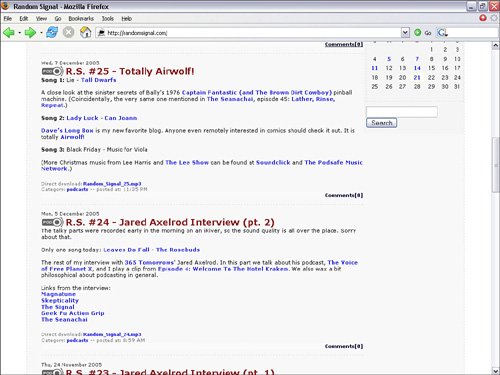Preparation
| Preparation is one of the most important things you will do once you set up your podcasting rig. It's not quite as easy as just setting up the rig and then talking into the microphone, of course. But your preparation is going to show in the quality of your podcast. What are you going to talk about? Are you going to stick to certain subjects, or choose just one and ad-lib? Now, don't get us wrong; there's nothing wrong with ad-libbing, but turning on the microphone when you have nothing to say is one of the nails in the coffin of your podcast. Prep work can include simply writing down a couple comments to stick to, or surfing the Web for a topic to give your opinion on. This is, of course, if you're doing a personal audioblog and you just want to keep track of topics that interest you. If your podcast has a focused topic, whether it is sports or politics or movie reviews, then you definitely need to do your homework before starting. Given that you are very likely recording your podcast on your computer, your access to the Internet is at your fingertips. Be sure to have a browser up with windows open for the news, sports scores, or odd fad that you want to talk about. If you want to do an interview show, a fiction show, or a music show, then your prep work takes a bit more planning. You absolutely have to know something about someone before you interview them. You need to listen to their podcast, read their book, or at least visit their website to become familiar with them before asking questions. Rob will listen to a minimum of two to five shows before he interviews the guests for his podcast (more about this in Chapter 7, "The Art of the Interview.") The amount of prep time varies with what kind of podcast you are doing. Consider your preparation as the important first step before you begin recordingwithout it, you're likely to just go on and on without a plan, and no one likes to listen to that. Jason Adams from Random Signal (www.randomsignal.com, see Figure 6.1), a podcast featuring independent music from Chapel Hill, NC and other areas of the South, uses the Internet and brief notes to keep his show straight. Figure 6.1. Random Signal uses a casual show notes form, somewhat chatty with pertinent links.
One pitfall some podcasters encounter is thinking that if they have a co-host, they can just bounce off each other without planning anything. It is possible that certain people out there can completely ad-lib a 20-minute (or more!) show, but they are rare. Sadly, the majority of podcasts that attempt this end up podcasting a normal conversation between two people, often uncomfortable and giggly when they can't think of something to talk about. Although you may get a voyeuristic thrill listening to it, the novelty soon wears off and you're wondering why these boring people are wasting your time and space on your MP3 player. Prep is vital to any podcast. Even if your notes just say, "I want to talk about Harry Potter this podcast," that is at least a launching pad. But what about Harry Potter? The books? The movies? Speculations on the future stories or perhaps a discussion of J.K. Rowling's prose styling? And after you decide what you want to talk about, you'd better make sure you're up on all the topics before you open your mouth. If you get something wrong, someone will let you know about it. |
EAN: 2147483647
Pages: 162
